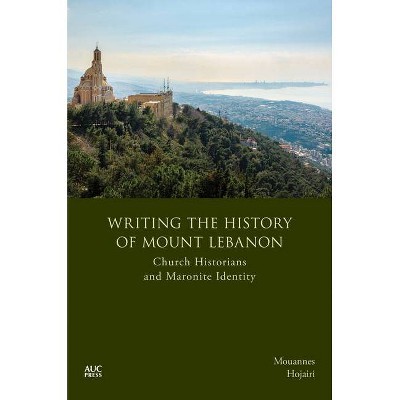Writing the History of Mount Lebanon - by Mouannes Hojairi (Hardcover)

Similar Products
Products of same category from the store
AllProduct info
<p/><br></br><p><b> About the Book </b></p></br></br>"As a frequently contested territory, Mount Lebanon has an equally contested history, one that is produced, shaped, and revised by as many players as those who molded the Lebanese state since its inception in 1920. The Lebanese Maronite Church has had more at stake in the process of history writing than any other group or institution. It is arguably one of the most influential institutions in Lebanese history and definitely the most influential institution in the country at the moment of the state's birth. Writing the History of Mount Lebanon traces the genealogy of Maronite identity by examining the historical traditions that shaped its contemporary manifestation. It explores the presence of a tradition in Maronite Church historiography that was maintained by the historians of the Church, whose claims and hypotheses ultimately defined the communal identity of the Maronites in Mount Lebanon and deeply influenced subsequent Lebanese national identity. Rooted in a reexamination of the existing literature and bringing evidence to bear on this particular aspect of history-writing in Lebanon it shows how early Maronite ecclesiastic historiography's plea for inclusion as a part of Catholic orthodoxy was transformed and recast in subsequent centuries by lay and secular historians into a demand for exclusion and exclusivity, which in turn led to the rise of exclusivist political identities based on sectarian belonging in Mount Lebanon. Ultimately, Mouannes Hojairi shows how history-writing is one of the main instruments in generating and perpetuating nationalist ideologies and how historians are central agents of nationality."--<p/><br></br><p><b> Book Synopsis </b></p></br></br><p><b>A meticulous deconstruction of Maronite history writing and the ways in which Lebanese nationalist myths have been invented and perpetuated by historians</b> <p/>As a frequently contested territory, Mount Lebanon has an equally contested history, one that is produced, shaped, and revised by as many players as those who molded the Lebanese state since its inception in 1920. The Lebanese Maronite Church has had more at stake in the process of history writing than any other group or institution. It is arguably one of the most influential institutions in Lebanese history and definitely the most influential institution in the country at the moment of the state's birth. <p/><i>Writing the History of Mount Lebanon</i> traces the genealogy of Maronite identity by examining the historical traditions that shaped its contemporary manifestation. It explores the presence of a tradition in Maronite Church historiography that was maintained by the historians of the Church, whose claims and hypotheses ultimately defined the communal identity of the Maronites in Mount Lebanon and deeply influenced subsequent Lebanese national identity. Rooted in a reexamination of the existing literature and bringing evidence to bear on this particular aspect of history-writing in Lebanon, it shows how early Maronite ecclesiastic historiography's plea for inclusion as a part of Catholic orthodoxy was transformed and recast in subsequent centuries by lay and secular historians into a demand for exclusion and exclusivity, which in turn led to the rise of exclusivist political identities based on sectarian belonging in Mount Lebanon. <p/>Ultimately, Mouannes Hojairi shows how history-writing is one of the main instruments in generating and perpetuating nationalist ideologies and how historians are central agents of nationality.</p><p/><br></br><p><b> Review Quotes </b></p></br></br><br>Mouannes Hojairi provides a most important history of how Maronite identity was conceived in Lebanon and how crucial church historians were to the creation of nationalist mythology. The details this book unravels are essential to understanding contemporary Lebanese nationalism and sectarian politics.--<b>Joseph Massad, Columbia University</b> <p/> In this careful deconstruction of Maronite history-writing from the sixteenth century to the present day, Mouannes Hojairi forcefully shows that Lebanese historians, and Maronite historians in particular, have continued to write tendentious, religiously tainted histories of their country. In doing so, they uncritically reproduce older narratives, including pure lore, that thus survive through the centuries, even though their original empirical evidence is flimsy at best. This book will serve as a salutary lesson for historians and history writers today.--<b>Sune Haugbølle, Roskilde University, Denmark</b> <p/> "With a shrewd elegance and well-versed skill of sailing between myth and fact, which are, in the case of Lebanon, a woven tapestry of church and civil history, almost impossible to disentangle, Hojairi emerges as a miracle-maker capable of delivering a coherent narrative that defies the reality of Lebanon and somehow makes sense of its interconnected counterfactual religious histories, while laying bare their complexity for everyone to see and enjoy."--<b>George Saliba, American University of Beirut and Columbia University</b><br><p/><br></br><p><b> About the Author </b></p></br></br><b>Mouannes Hojairi </b>is assistant professor of history at the American University in Cairo. He received his PhD from Columbia University in 2011. In 2009-2010 he was visiting assistant professor of Middle Eastern Studies at Bard College and in 2010-2013 he was Andrew Mellon Postdoctoral Fellow in Africana Studies at Vassar College. His research is focused on the relationship between history-writing and identity formation specifically on historiography and the rise of nationalist identities in the Modern Middle East.
Price History
Price Archive shows prices from various stores, lets you see history and find the cheapest. There is no actual sale on the website. For all support, inquiry and suggestion messages communication@pricearchive.us




















